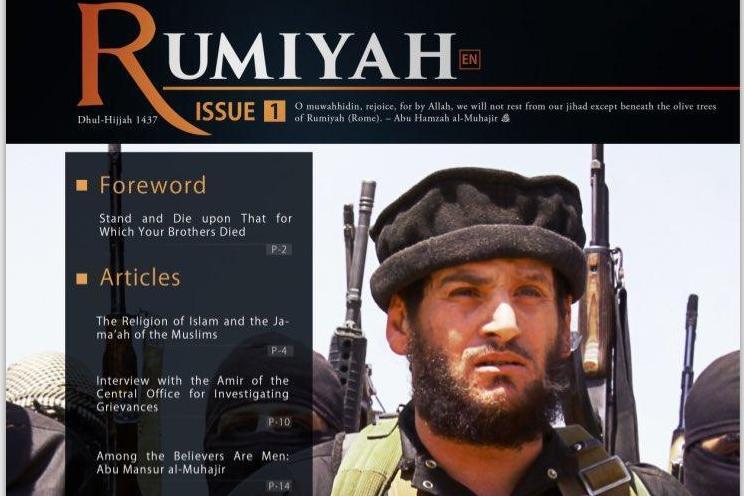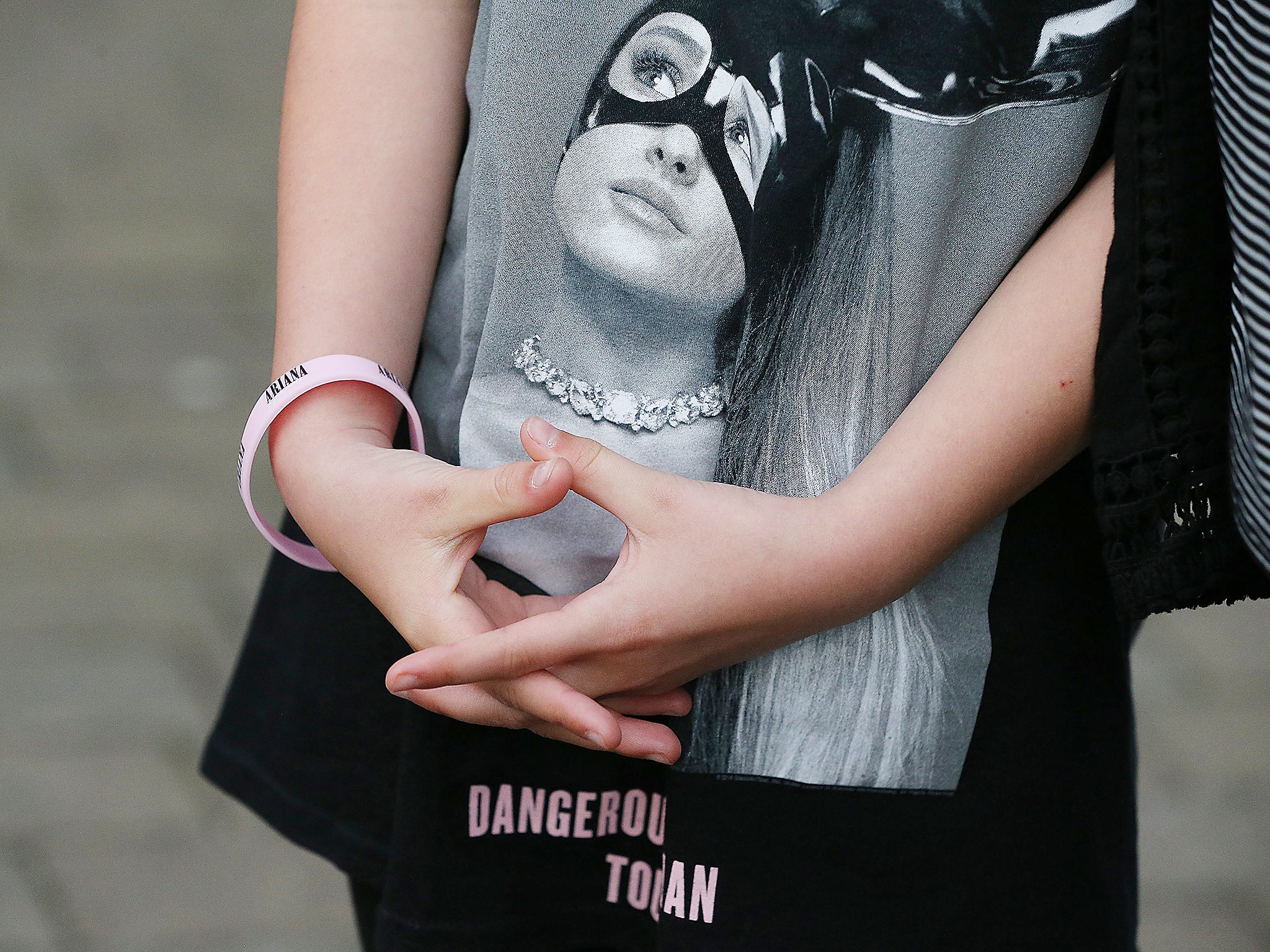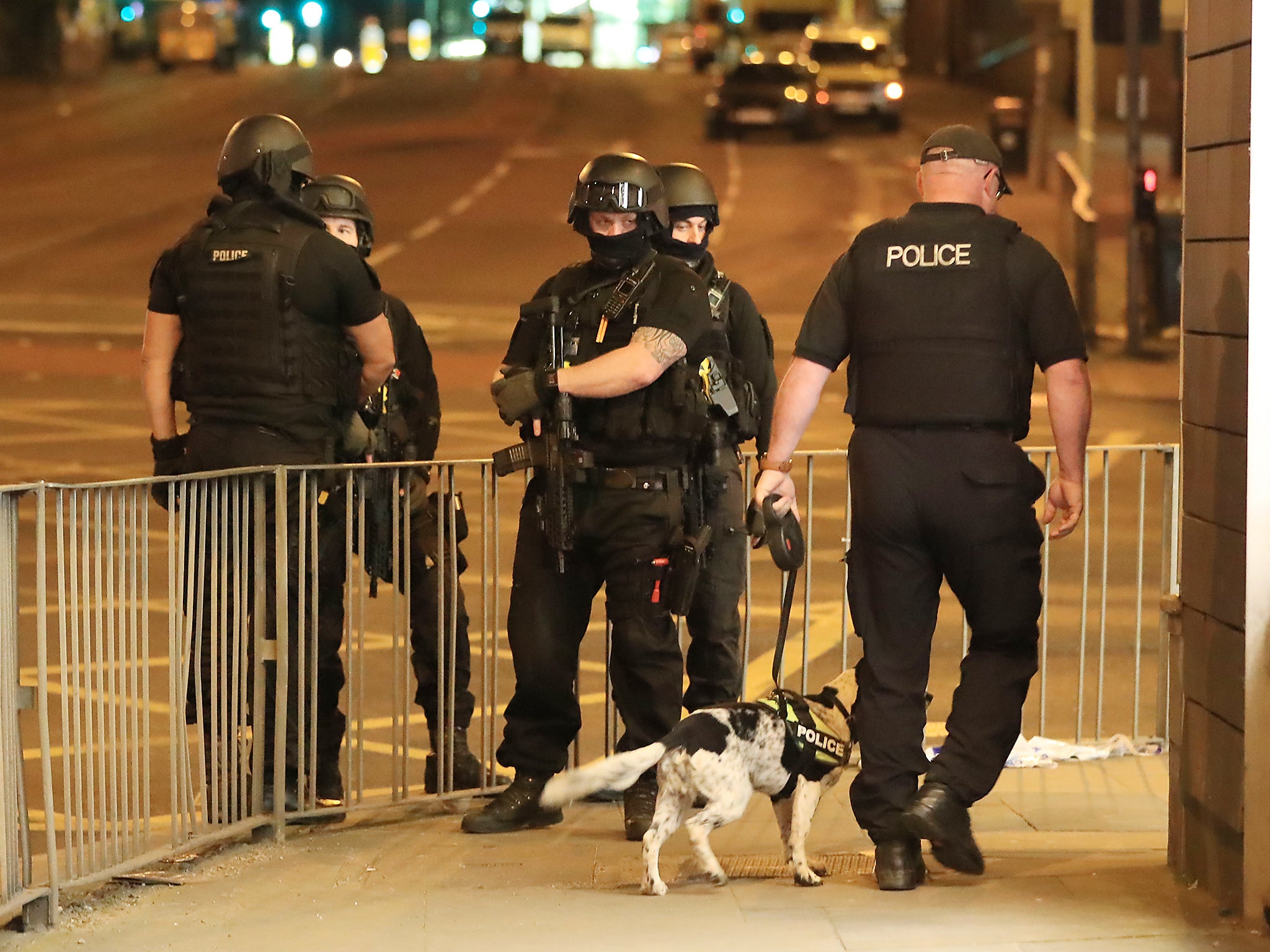Manchester Arena bombing: Everything we know about the suicide attack that killed at least 22 people
Police identify attacker amid investigation into potential wider network
Your support helps us to tell the story
From reproductive rights to climate change to Big Tech, The Independent is on the ground when the story is developing. Whether it's investigating the financials of Elon Musk's pro-Trump PAC or producing our latest documentary, 'The A Word', which shines a light on the American women fighting for reproductive rights, we know how important it is to parse out the facts from the messaging.
At such a critical moment in US history, we need reporters on the ground. Your donation allows us to keep sending journalists to speak to both sides of the story.
The Independent is trusted by Americans across the entire political spectrum. And unlike many other quality news outlets, we choose not to lock Americans out of our reporting and analysis with paywalls. We believe quality journalism should be available to everyone, paid for by those who can afford it.
Your support makes all the difference.Children are among at least 22 people have been killed and dozens more injured in a suicide bombing at Manchester Arena.
Families were leaving a concert by pop singer Ariana Grande when the blast ripped through the foyer leading to Victoria station at around 10.35pm on Monday.
Isis has claimed responsibility for the atrocity, which is being treated as a terrorist incident by police.
Follow the latest updates on our live blog here
What happened?
Police were called to reports of an explosion shortly after the end of Grande’s concert at 10.33pm, as thousands of fans streamed out of Manchester Arena.
Witnesses described being thrown through the air by a powerful blast that left nuts and bolts across the floor.
Chris Parker, a rough sleeper who was in the foyer at the time, said: “Everyone was piling out, all happy and everything else.
"As people were coming out of the glass doors I heard a bang and within a split second I saw a white flash, then smoke and then I heard screaming.
"It knocked me to the floor and then I got up and instead of running away my gut instinct was to run back and try and help.
"There was people lying on the floor everywhere.”
The 33-year-old saw one girl whose legs had been blown off, and attempted to comfort a woman in her 60s who died of severe injuries in his arms.
Concert goers still inside the arena described mass panic at the blast echoed through the venue.
"A huge bomb-like bang went off that hugely panicked everyone and we were all trying to flee the arena,” said Majid Khan, 22.
"It was one bang and essentially everyone from the other side of the arena where the bang was heard from suddenly came running towards us as they were trying to exit.”
Ian Hopkins, the Chief Constable of Greater Manchester Police, said investigators believe the attack was carried out by a lone suicide bomber “carrying” a homemade device.
“The priority is to establish whether he was acting alone or as part of a network,” he added.
“The attacker, I can confirm, died at the arena. We believe the attacker was carrying an improvised explosive device which he detonated causing this atrocity.”
More than 240 calls were made to the emergency services, with responders including 60 ambulances flooding the area alongside more than 400 police officers.
Who was behind it?
Police have identified the perpetrator but said it was too early in the investigation to publicly release his name.
Isis claimed responsibility for the attack, hailing a "soldier of the caliphate" but suggesting he did not die in the blast.
The group has been periodically releasing detailed guidance on how to carry out terror attacks on “disbelievers” in countries targeting its militants in Syria and Iraq.
The most recent edition of its Rumiyah propaganda magazine listed concert halls among “ideal target locations” for attacks.
Analysts have warned that the group may increasingly turn to “soft targets” with large crowds, as seen in Westminster, Stockholm, Nice and Berlin, rather than protected areas with a high security presence.
Explosive devices using homemade triacetone triperoxide (TATP) have become a signature of the group’s largest European attacks in Paris and Brussels, and has been discovered in several foiled plots.
The Manchester attack took place on the fourth anniversary of the killing of Fusilier Lee Rigby in Woolwich, which was inspired by al-Qaeda propaganda on avenging civilian casualties in the Middle East.

How many people have been killed?
Police have confirmed at least 22 dead and 59 injured, including 12 children, although the toll could rise as victims remain in hospital and recovery work continues.
Officials have not yet publicly identified any of the victims, amid online appeals for information on dozens of missing people.
Among those killed is eight-year-old Saffie Rose Roussos, who was at the concert with her mother and sister, and 18-year-old Georgiana Callander from Manchester.
They were originally one of dozens of children and teenagers who had not been heard of since the explosion.
They include Laura MacIntyre, 15, and Eilidh MacLeod, 14, both from the Scottish island of Barra, Olivia Campbell, 15, Martyn Hett, 29, Chloe Rutherford, 17, Liam Curry, 19,Courtney Boyle, Philip Tron, Angelika and Marcin Klis and Wendy Falwell.
Facebook activated a safety check feature so that people can let their family and friends know they are safe, as the Twitter hashtag #MissingInManchester was used to track appeals.
Police have established a help centre at the Etihad Stadium, access Gate 11, for anyone who needs assistance in tracing loved ones.
Emergency numbers have been established for anyone who is concerned for loved ones on 0161 856 9400 or 0161 856 9900.
Police have also appealed for concert-goers and witnesses to provide them with any footage they have from the scene if they believe it can assist the probe.
To report any concerns about suspicious activity, call the anti-terrorist hotline on 0800 789 321.

What have police said?
Greater Manchester Police have urged people to stay away from a large cordon around Manchester Arena and Victoria station while investigations continue.
They are working with the National Counter Terrorist Policing Network and UK intelligence services to establish more details about the bomber.
Scotland Yard has put extra officers on duty in London in the wake of the Manchester bombing, including armed personnel.
It came exactly two months after the Westminster attack, by Isis-inspired extremist Khalid Masood.
Metropolitan Police Commissioner Cressida Dick condemned the attack as “utterly appalling”, adding: “My thoughts are with the people of Manchester as they try to come to terms with the horrific events that took place in their city last night.
"Our colleagues from Greater Manchester Police and their emergency services showed huge bravery as they ran towards the confusion and danger.
"We are providing every possible support through the counter-terrorism network as investigators work tirelessly to understand what has happened.”

How have politicians reacted?
All general election campaigning has been suspended ahead of the 8 June vote as a mark of respect to the victims, with flags flying at half-mast across the UK.
Theresa May held a meeting of the Government’s emergency Cobra committee following the “callous terrorist attack” on Tuesday morning.
“While we experienced the worst of humanity in Manchester last night, we also saw the best,” she said, condemning the attacker's “cowardice”.
The Prime Minister said it was among the "worst terrorist incidents we have ever experienced in the United Kingdom", adding that police and security services were working to establish the full picture.
Andy Burnham, the Labour politician and mayor of Manchester, condemned the “evil act”.
"It is hard to believe what has happened here in the last few hours, and to put into words the shock, anger, and hurt that we feel today,” he added.

"These were children, young people and their families that those responsible chose to terrorise and kill.”
Mr Burnham urged Mancunians to “come together” following the atrocity, praising the actions of volunteers who have opened their homes to victims, flooded to blood banks and given families free rides around Manchester.
He announced a vigil to be held on Tuesday evening in Manchester’s Albert Square.
The Muslim Council of Britain described the attack as “horrific” and “criminal”.
“May the perpetrators face the full weight of justice both in this life and the next,” said secretary general Harun Khan.
Global politicians have been sending their condolences, including Vladimir Putin, Emmanuel Macron, Xi Jinping and Angela Merkel.
Speaking during a press conference in the Occupied Palestinian Territories, Donald Trump called the perpetrators “evil losers”.
How have musicians reacted?
Ariana Grande, who had left the stage shortly before the explosion, tweeted that she was “broken”, adding: “From the bottom of my heart, I am so so sorry. I don't have words.”
Musicians and celebrities across the globe voiced their shock.
Taylor Swift sent her “thoughts, prayers and tears”, while David Beckham said his thoughts were with all those affected.
Ellie Goulding, Katy Perry, Demi Lovato, Harry Styles, Nicki Minaj, Selena Gomez, Boy George and Lorde also sent their condolences, while Liam Gallagher tweeted that he is “in total shock and absolutely devastated”.
Peter Hook, of Manchester bands New Order and Joy Division, said that daughter “made it home safe” from concert, adding: “My heart goes out to all parents & those involved. Manchester stay strong.”

Join our commenting forum
Join thought-provoking conversations, follow other Independent readers and see their replies
Comments